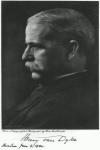For the St. Nicholas Society of New York
Among the earliest saints of old, before the first Hegira,
I find the one whose name we hold, St. Nicholas of Myra:
The best-beloved name, I guess, in sacred nomenclature,
The patron-saint of helpfulness, and friendship, and good-nature.
A bishop and a preacher too, a famous theologian,
He stood against the Arian crew and fought them like a Trojan:
But when a poor man told his need and begged an alms in trouble,
He never asked about his creed, but quickly gave him double.
Three pretty maidens, so they say, were longing to be married;
But they were paupers, lack-a-day, and so the suitors tarried.
St. Nicholas gave each maid a purse of golden ducats chinking,
And then, for better or for worse, they wedded quick as winking.
Once, as he sailed, a storm arose; wild waves the ship surrounded;
The sailors wept and tore their clothes, and shrieked We'll all be drownded!
St. Nicholas never turned a hair; serenely shone his halo;
He simply said a little prayer, and all the billows lay low.
The wicked keeper of an inn had three small urchins taken,
And cut them up in a pickle-bin, and salted them for bacon.
St. Nicholas came and picked them out, and put their limbs together,
They lived, they leaped, they gave a shout, St. Nicholas forever!
And thus it came to pass, you know, that maids without a nickel,
And sailor-lads when tempest blow, and children in a pickle,
And every man that's fatherly, and every kindly matron,
In choosing saints would all agree to call St. Nicholas patron.
He comes again at Christmas-time and stirs us up to giving;
He rings the merry bells that chime good-will to all the living;
He blesses every friendly deed and every free donation;
He sows the secret, golden seed of love through all creation.
Our fathers drank to Santa Claus, the sixth of each December,
And still we keep his feast because his virtues we remember.
Among the saintly ranks he stood, with smiling human features,
And said, Be good! But not too good to love your fellow-creatures!






